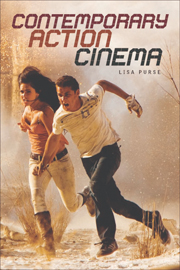Book contents
- Frontmatter
- Contents
- Illustrations
- Acknowledgements
- Introduction: ‘Where are we, and how did we get here?’
- 1 Narrative and the action film
- 2 The action body
- 3 The action sequence
- 4 Action women
- 5 Action men
- 6 Race in the action film
- 7 Homosexuality in the action film
- 8 Action cinema after 9/11
- 9 The ‘European connection’
- Afterword
- Bibliography
- Filmography
- Television Series
- Index
6 - Race in the action film
Published online by Cambridge University Press: 05 August 2013
- Frontmatter
- Contents
- Illustrations
- Acknowledgements
- Introduction: ‘Where are we, and how did we get here?’
- 1 Narrative and the action film
- 2 The action body
- 3 The action sequence
- 4 Action women
- 5 Action men
- 6 Race in the action film
- 7 Homosexuality in the action film
- 8 Action cinema after 9/11
- 9 The ‘European connection’
- Afterword
- Bibliography
- Filmography
- Television Series
- Index
Summary
Transformers (Michael Bay, 2007) opens with a racially mixed group of US Special Operations soldiers engaged in lively banter on an air transport over Qatar, reminiscing about their shared homeland which, they reveal, means different things to each of them. The brief scene establishes that the men – an African American, a Latin American and two Anglo Americans from different regions of the US – have a history together as a military unit and have developed a teasing but affectionate camaraderie that transcends their racial and regional differences. This depiction of multiracial harmony reflects the increased racial mix of the urban action movie over the previous decade that Beltrán (2005) has observed, but is also an expression of Hollywood's adherence to the ‘melting pot’ myth that the US is ‘a model of multiculturalism and globalism’, a place where people of different backgrounds can co-exist peacefully (Beltrán and Fojas 2008: 18). And yet the scene also explicitly foregrounds ethnic and cultural difference as a cause of frustration. The Latin American soldier ‘Fig’ (short for Figueroa, and played by Amaury Nolasco) is wishing he could eat a plate of his mother's alligator meat when African American Epps (Tyrese Gibson) interrupts to register his disgust at such a gastronomic prospect. Fig counters by pointing out pragmatically that the alligators have the most succulent meat, and then slips into further description in Spanish. Epps objects (‘English, please’) and Anglo American Captain Lennox (Josh Duhamel) backs Epps up with: ‘English. I mean, how many times? We don't speak Spanish, I told you that.
- Type
- Chapter
- Information
- Contemporary Action Cinema , pp. 112 - 130Publisher: Edinburgh University PressPrint publication year: 2011



